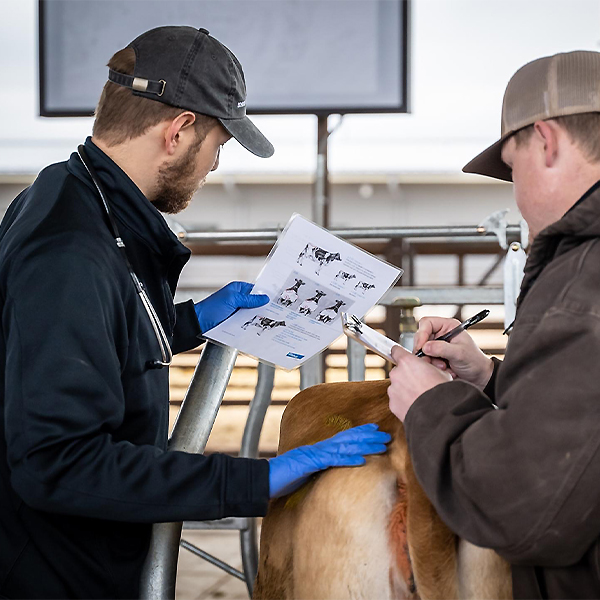
Fourth-year student Kameron Deterding is passionate about serving the veterinary needs for rural communities and the livestock industry.
If you asked Kameron Deterding eight years ago what his future looked like, he probably
wouldn’t picture walking across the stage to receive his veterinary degree from Texas
Tech University’s School of Veterinary Medicine.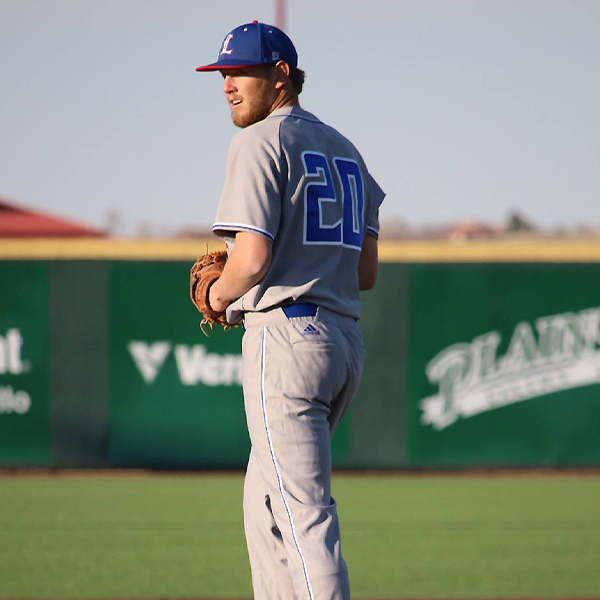
In fact, eight years ago he had a scholarship to play baseball for Lubbock Christian University (LCU) as a relief pitcher. For three years he played ball with the intention of one day maybe going pro.
However, those plans began to change as he realized that through his undergraduate major in animal science with an emphasis in pre-vet and his deep life experiences rooted in livestock and agriculture he could make a difference as a veterinarian.
“I come from a family line of farming and ranching, which has helped shaped my interests today,” Deterding said. “My parents and grandparents still operate our red angus cow-calf operation today in the northeastern corner of Colorado.”
Kameron is originally from Wray, Colorado, but at an early age he moved to Lubbock, Texas, where he spent majority of his life. However, Colorado has always been a second home to him.
“Although growing up in Lubbock, we frequently made the trips to Colorado to assist with the ranch operation,” Deterding said. “I have always been interested in the rural ranching lifestyle, so it became important for me to make the trips as much as I could. Being from a small town and growing up in West Texas has driven my interests to the outdoors, animals and small-town values.”
Deterding is ready to bring his knowledge and skills to serve the veterinary needs of rural and regional communities. Let’s get to know Deterding more through a series of questions.
What are you passionate about in veterinary medicine?
I am passionate about large animal medicine. Being able to assist in providing excellent care to rural livestock producers, especially cattle, is one of the most rewarding experiences I have been apart of.
At the beginning of veterinary school, I did not have much equine experience. However,
through veterinary school and especially clinical year, I have grown to really enjoy
equine medicine, especially lameness examination.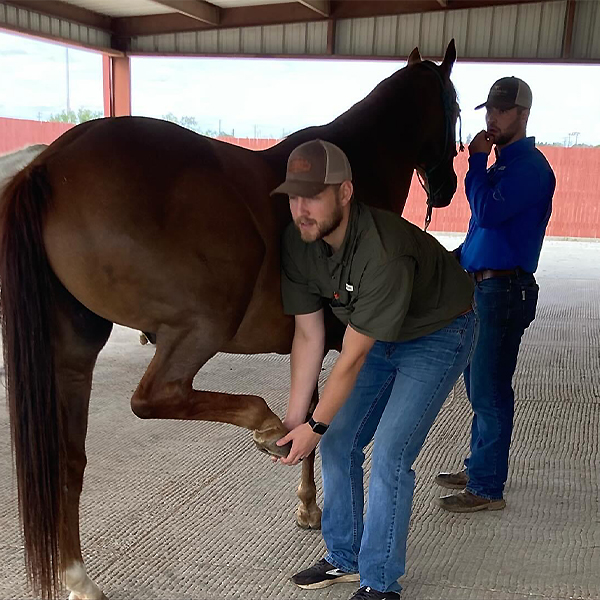
I do enjoy working with small animals and providing care to household pets. I love the challenge of small animal medicine and the substantial medical and surgical options available. Some rural areas aren’t able to provide extensive medicine and surgery to animal owners. Owners often have to travel to larger cities to receive that care for their companion animals.
My goal is to help fill that need in rural communities by working toward furthering my knowledge and skills to provide that “higher end” care. Texas Tech and the clinical partners have helped provide the needed hands-on experiences to help meet that goal with all the students.
What are some life experiences that led you to that passion? 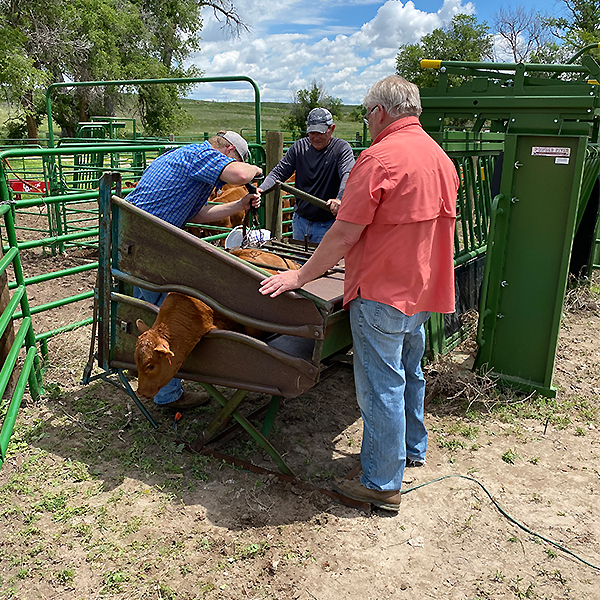
I knew from a young age that I wanted to pursue a career in the agriculture industry. Working with animals has always been an enjoyable experience for me. Growing up, I joined my grandfather and father in spring branding of our calves every year I could. Being able to raise cattle to help feed the nation is not an easy job. I knew I wanted to help any way I could. Those experiences drove my desire of large animal medicine.
What inspired you to be a veterinarian?
My path to veterinary medicine was somewhat uncommon compared to many others. I grew up playing baseball and had the typical mindset of wanting to play professionally. However, I kept an interest in animals during this same time through our family cow-calf ranch and household pets. I knew I wanted a career with animals and wanted to be either a ranch manager or a feedlot nutritionist.
When I received a scholarship and spot to play baseball for LCU, I intended to major in animal science, but my parents suggested I try a pre-vet emphasis as well since the courses were very similar. Flash forward to the summer after my first year in undergrad, I interned at a rural mixed animal veterinary clinic in Colorado to get experience in the profession. It did not even take the whole day before I realized veterinary medicine was my passion and I wanted to pursue the path to veterinary school.
My family has raised cattle for many years and have seen the lack of veterinary care in rural areas. I knew that I wanted to fill that need of providing veterinary care to animals and producers in underserved areas.
How do you plan serve the veterinary needs of rural and regional communities after graduation?
I have accepted a position as an associate veterinarian at Twin Forks Clinic in rural northeastern Colorado. The practice is mixed animal and is actively working on filling the underserved rural communities in the tri-state area of Colorado, Nebraska and Kansas.
This region is one of the top beef cattle producing areas in the industry. No doubt the practice will help meet my goal of providing veterinary care to rural communities. My family ranch is also close by, which is definitely an added benefit.
Why did you choose Texas Tech? 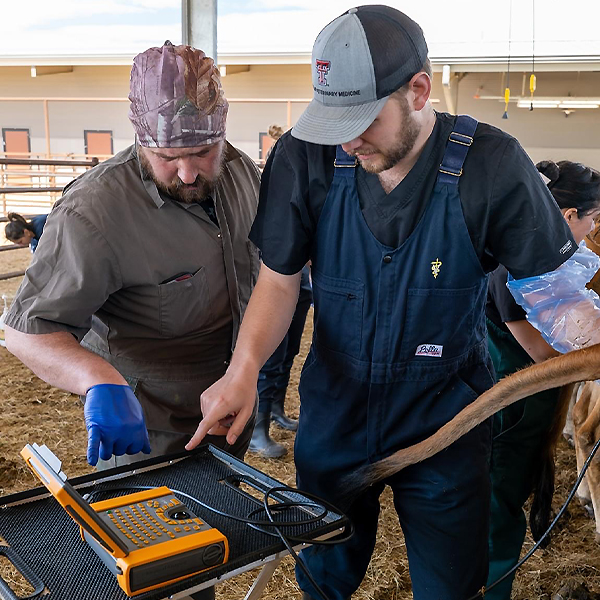
I knew immediately I wanted to go to Texas Tech University School of Veterinary Medicine when I first learned they had begun construction back in 2018. The more I learned of the school, the more I knew this was where I wanted to be.
Texas Tech wanted to put emphasis on large animal medicine which was the first reason I wanted to be accepted here. They also strive to offer the best hands-on experience which they have more than exceeded in these four years. This mission of Texas Tech and my desire of rural, mixed animal medicine made the decision to apply an easy choice.
How are you involved with the school?
I am a member of many clubs including the Student Chapter of the American Association of Equine Practitioners, Food Animal Club, Veterinary Business Management Association and the Christian Veterinary Fellowship. Being involved helped grow my passion for large animal medicine as well as meet many leaders in the industry.
That was a great way to broaden my social network and get to know some of the underclassmen in the process. The wet labs are my favorite aspect of the clubs when we are fortunate to learn extra skills outside of the scheduled labs through the curriculum. Some of my favorite wet labs have been the equine dental flotation, guttural pouch and stomach endoscopy, bovine embryo transfer and equine lameness labs.
How has your clinical year experience been?
My clinical year has definitely been the most exciting year of vet school. I have
grown a great deal as a veterinary student during these rotations. My favorite practices
have been Brock Veterinary Clinic, 6666 Ranch, Big Country Veterinary Clinic, Live
Oak Animal Hospital, and Twin Forks Clinic.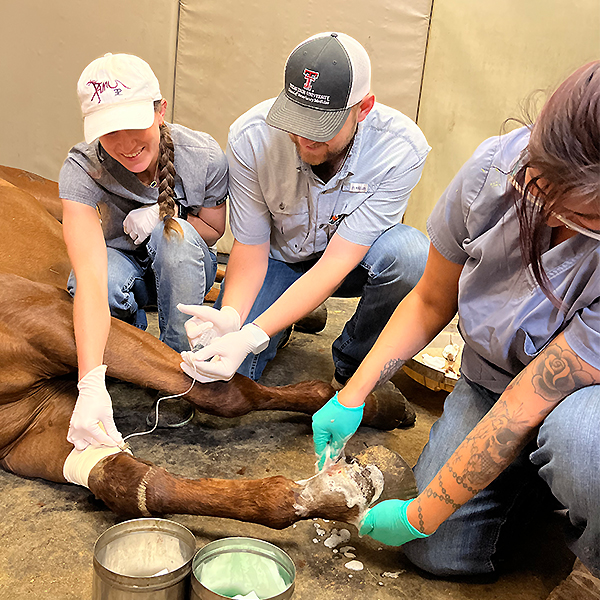
Brock Veterinary Clinic was my first clinical year rotation and my favorite as it succeeded all expectations I had for the clinical year. The doctors are great teachers and had us assisting with hands-on opportunities from the first day. I saw numerous lameness cases each day where we performed lameness examinations, diagnostic nerve blocks, radiography and joint injections. I was somewhat interested in equine lameness at that time, but after my four weeks at Brock, my knowledge and skills improved as well as my desire to continue lameness work following graduation. And of course, the emergency work after hours was plentiful. Horses afflicted with colic would travel from all over Texas and New Mexico to Lamesa, Texas to receive care from the best. I was fortunate to scrub into a colic surgery, which is not offered at many veterinary clinics. I scrubbed in and participated in many joint arthroscopy surgeries and other orthopedic procedures as well.
The 6666s Ranch was a unique experience compared to the rest of the rotations. Much of the veterinary work was performed on the ranch-owned horses, but there was a good amount of client-owned cases as well. Working at the ranch’s veterinary clinic involved early mornings, late nights and great cooking. One of the best parts was breaking from the busy workday to enjoy breakfast and lunch – courtesy of Ms. Susie – with the cowboys and staff.
Big Country Veterinary Clinic and Live Oak Animal Hospital were very similar in how
much they allowed me and other students to do. I performed my first limb amputation,
cystotomy, foreign body enterotomy and assisted with many orthopedic surgeries as
well. I was even able to set a personal record by completing 23 feline spays and neuters,
with the help of Dr. Wolfe, in the effort to control Lubbock’s stray cat population.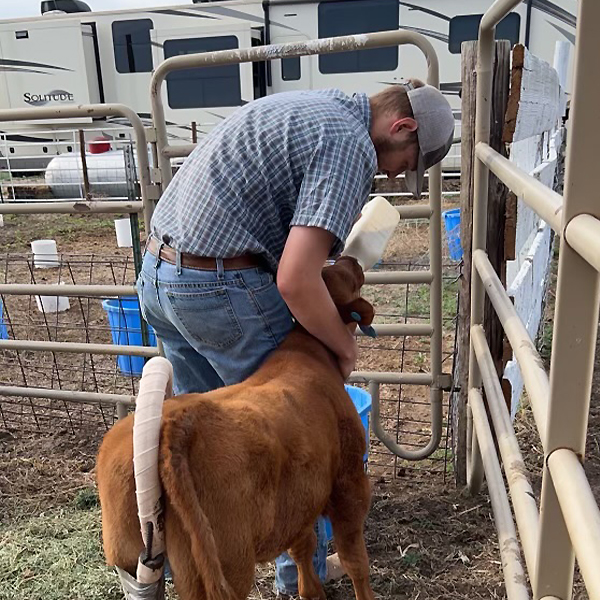
Finally, my time at Twin Forks Clinic exposed me to primetime busy calving season where it was not uncommon to receive multiple calving calls a day, more often at night. I performed my first ventral midline cesarean section, uterine and rectal prolapses, and perineal urethrostomy surgery. They prepared me for future calving seasons and work as a bovine practitioner.
How have you felt the clinical year has prepared you to be a better veterinarian?
The clinical year is exposing us to the more common clinical cases we are likely to
see upon graduation. Not only are we seeing the cases, but we are actively playing
a part in working up cases and treating the patient. I feel like the clinical year
model most definitely prepared me for clinical practice following graduation.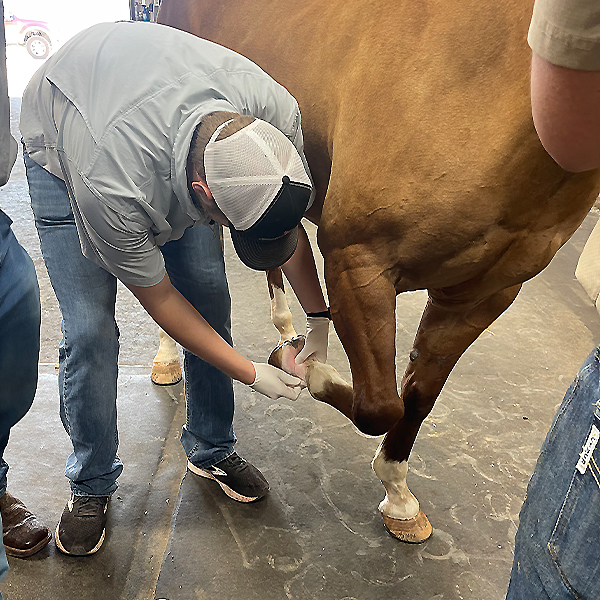
I am able to see the routine diseases and disorders that general practitioners see everyday. I am more “day-one ready” for practice than I would have been if I had gone through other veterinary school programs. For example, on my small animal rotations, I performed several routine surgeries such as limb amputation, foreign body gastrotomy/enterotomy, cystotomy, fracture repair, cesarean section and others. These experiences are monumental in preparing myself for the first year of practice.
Not only are the firsthand experiences beneficial in the clinical year, but the relationships with practice partners and staff have built me a network of colleagues. Each four-week rotation exposed me to different surgical and medical treatment options that are all correct, but I can see different solutions to treat the same problem. The clinical year is unlike any other and I believe myself and classmates are going to graduate practice day-one ready.
Can you talk about your excitement for graduation?
I have been looking forward to this day for four years and it is hard to believe graduation is so close. It seems like just yesterday I was going through orientation in August of 2021 and graduation was very far away. The past four years have flown by, and I am beyond thrilled to graduate – especially in the inaugural class.
Being in the first class has been such a blessing and a rewarding experience. It was not without difficulty, that is for sure. Getting to assist in molding the school’s veterinary curriculum is very unique, and we will be better veterinarians because of it. The past four years have been challenging and getting to walk across the graduation stage will be one of the most accomplishing moments of my life.
